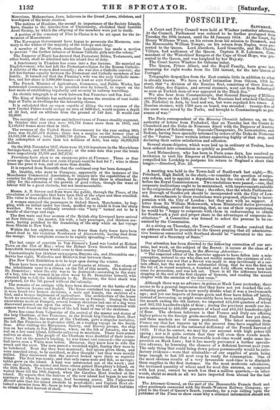Although there was no advance in prices at Mark Lane
yesterday, there- seems to be a general impression that they have not yet reached the cul- minating point. Wheat is now nearly double what it was a twelvemonth ago; and yet our imports of foreign grain and flour have fallen off lately,. instead of increasing, as might reasonably have been anticipated. During the month ending the 5th instant, we imported 425,866 quarters of wheat and 302,355 hundredweight of flour ; during the previous month our im- ports amounted to 468,000 quarters of wheat and 463,545 hundredweight of flour. The obvious inference is that France and Italy are offering higher prices to the foreign grain-merchant than England has yet done, and these markets are of course preferred. The latest accounts from France say that her imports up to the present time have supplied little more than one-third of the estimated deficiency of the French harvest of 1853. If that be correct, we may lay our account with high prices till spring ; nor is it quite certain that they will even then recede much. Many persons fancied that a favourable seed-time would make some im- pression on Mark Lane ; but it has merely prevented a further specula- tive advance, by lessening the chances of a deficient harvest next year. The only thing that could bring down prices permanently would be satis- factory evidence—were that attainable—of our supplies of grain being large enough to last till next crop be ready for consumption. One of the most obvious results of a very favourable aced-time is to diminish these supplies in the first instance. On the most moderate calculation, the increased quantity of wheat used for seed this autumn, as compared' with last year, cannot be much less than a million quarters,—in other words, about as much as all we have imported from abroad for the last: two months.


























 Previous page
Previous page